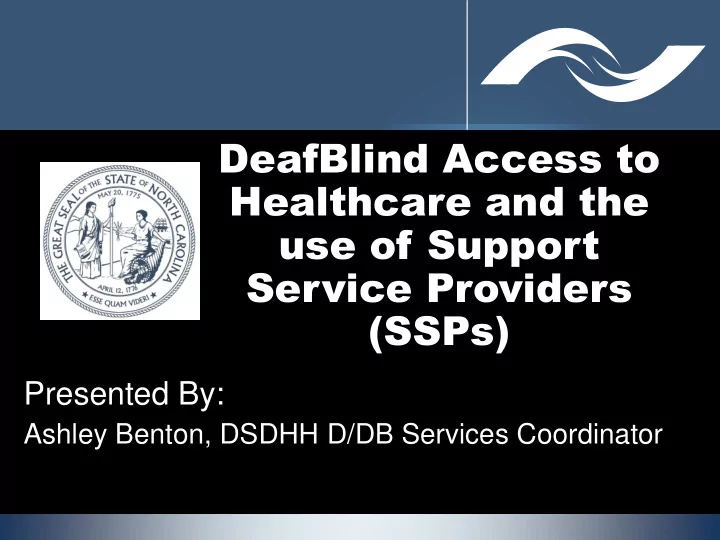

DeafBlind Access to Healthcare and the use of Support Service Providers (SSPs) Presented By: Ashley Benton, DSDHH D/DB Services Coordinator NCDHHS, Division of Services for the Deaf and Hard of Hearing 1
National Statistics • 2.4 Million DeafBlind Across the nation – North Carolina: 83,648 individuals with combined vision and hearing loss in NC. NCDHHS, Division of Services for the Deaf and Hard of Hearing 2
Incr Increased Ris eased Risks ks in in Older Older Adults Adults who ho ha have V e Vision ision and Hearing and Hearing Loss Loss • Cognitive Impairments • Depression • Mortality NCDHHS, Division of Services for the Deaf and Hard of Hearing 3
Challenges Challenges • Communication Access • Orientation and Mobility • Access to environment – informed choices • Transportation NCDHHS, Division of Services for the Deaf and Hard of Hearing 4
Support Service Provider • Visual and Environmental Information • Human Guiding • Transportation • Access to written materials • Support with informal communication NCDHHS, Division of Services for the Deaf and Hard of Hearing 5
Support Service Provider • Enhances Independence • Should be trained • Assists in a variety of settings: work, home, recreation, and social • Adheres to RID CPC • Can either be voluntary or paid NCDHHS, Division of Services for the Deaf and Hard of Hearing 6
National SSP Services • HKNC list of SSP Programs across the nation • SSP Services in other states – Funding source – Eligibility – Program design NCDHHS, Division of Services for the Deaf and Hard of Hearing 7
Services in NC • NCDBA Volunteer Database – NCDBA Camp Dogwood DeafBlind Weekend – NCDBA Conference – DeafBlind events • DHHS DeafBlind Employees & Consumers – DSSVPL, contracted and paid for services NCDHHS, Division of Services for the Deaf and Hard of Hearing 8
Purpose of the SSP Survey • Ran from March 2018-March 2019 • Three versions; Consumers, Family Members, and Providers. • Distributed at events, home visits, and via email and Facebook. • Reading/Signing of the survey was provided upon request. NCDHHS, Division of Services for the Deaf and Hard of Hearing 9
Total completed: 258 Consumers: 101 Family: 35 Providers: 122 NCDHHS, Division of Services for the Deaf and Hard of Hearing 10
Ho How w helpful ar helpful are SSPs e SSPs? NCDHHS, Division of Services for the Deaf and Hard of Hearing 11
Medical Medical Appointment ppointments 71% of consumer responses indicate they rely on the support of family members to gain access to medical appointments. "Having an SSP will help to keep my medical appointments" "I go to doctor appointments less often" NCDHHS, Division of Services for the Deaf and Hard of Hearing 12
Top two for “If you had access to SSP services, which activities would (you, your family member, your consumer) regularly attend…” Consumers: - Medical appointments - Grocery shopping Family: - Medical appointments - Family events Providers: - Community events - Medical appointments NCDHHS, Division of Services for the Deaf and Hard of Hearing 13
"SSP, the little service that I do get at events have been a life changing thing for me." "People in my situation would very much like to feel as independent as possible. More than that, we need to be safe from harm. Some of us has fallen, tripped, and have hurt ourselves with friends and family members. SSPs do so much for us." NCDHHS, Division of Services for the Deaf and Hard of Hearing 14
Recommenda ecommendations tions • To look to DHHS for the establishment of SSP services. – Access to SSPs will increase independence which improves quality of life, life expectancy and well-being. • Education of front line staff to have basic understanding of how to assess for DB and the appropriate next steps. – Early identification and appropriate referrals for support services is vital. NCDHHS, Division of Services for the Deaf and Hard of Hearing 15
Recommend
More recommend